Allergy Testing: How to Know What Is Reliable
- The London Allergy Clinic

- Nov 1, 2024
- 3 min read
Updated: Nov 22, 2024
When it comes to allergy testing, the options available can feel overwhelming. From High Street retailers to online tests, there are countless services claiming to offer accurate insights into your allergies. Prices vary widely, and it can be difficult to separate scientifically proven methods from those that are simply not credible.
Understanding what makes an allergy test reliable is essential for both your health and your wallet. At The London Allergy Clinic, we’re here to demystify the process and guide you toward evidence-based solutions. Whether you’re dealing with food allergies, pollen sensitivities, or other allergic conditions, choosing the right test can make all the difference in managing your health effectively.

The Essentials of Reliable Allergy Testing
1. Proven Methods: Skin Prick Testing and Specific IgE Blood Testing
When it comes to reliable allergy testing, two methods stand out: skin prick testing and specific IgE (blood) testing. These are the only scientifically validated approaches for accurately identifying allergies.
• Skin Prick Testing: Performed by qualified professionals, this method involves placing a small amount of allergen on the skin and measuring the size of the wheal (raised bump) that develops. Results are presented in precise terms, such as “grass pollen 4mm x 3mm,” and interpreted within the context of positive and negative controls. This ensures validity and accuracy.
• Specific IgE Blood Testing (RAST): Conducted in reliable laboratories, such as those accredited by UKAS, this test measures the levels of specific IgE in your blood related to particular allergens. The results should be presented in the form of a number for example “grass pollen 6.14 kUA/L” which indicates the concentration of IgE measured in the blood in relation to a specific allergen.
Each result is then given a grade from 0 to 6, which indicates whether it is positive or negative. Grade 0 is a negative result, and grades 1-6 are usually positive results, each one indicating an increasing level of IgE sensitisation. It is important to have both the number and the grade presented in the results. A grade on its own is not clinically useful.
2. Avoiding Unreliable Methods
Not all tests on the market are scientifically sound. Commonly advertised methods such as IgG testing or hair analysis lack validation and should be approached with caution. These tests can lead to unnecessary dietary or lifestyle changes based on inaccurate findings.
Why Professional Interpretation Is Crucial
Interpreting allergy test results requires medical expertise. A positive result doesn’t necessarily confirm an allergy, just as a negative result doesn’t guarantee its absence. A qualified clinician will assess your results alongside your clinical history and symptoms, ensuring an accurate diagnosis and appropriate guidance.
Making changes to your diet or lifestyle without professional advice can lead to complications. For example, avoiding certain foods unnecessarily can result in nutritional deficiencies. Trust a specialist to help you make informed decisions.
How The London Allergy Clinic Can Help
At The London Allergy Clinic, we offer evidence-based allergy testing services tailored to your unique needs. Our clinics in Marylebone and High Barnet provide a range of testing options, ensuring you receive reliable results interpreted by experienced professionals.
Our Services
Skin Prick Testing
Conducted in a controlled environment by qualified clinicians, our skin prick testing provides precise measurements to help diagnose allergies.
Specific IgE Blood Tests
Our specific IgE blood tests are processed in UKAS-accredited laboratories, ensuring accuracy and reliability.
Molecular-Component IgE
This advanced method offers deeper insights into allergen components, allowing for a more detailed understanding of your allergies. Learn more here.
Allergy Explorer Testing
The comprehensive Allergy Explorer Testing covers a wide range of allergens, making it ideal for complex cases.
Home Allergy Testing with ALEX Allergy Xplorer
For those who prefer the convenience of at-home testing, we offer the ALEX Allergy Xplorer panel test. This state-of-the-art test is:
• Suitable for adults and children over 18 months.
• Processed in a UKAS-accredited laboratory.
• Capable of detecting sensitivities to 295 allergens, including food, environmental, mould, and insect allergens.
• Designed to provide easy-to-read results that are highly accurate and reliable.
This at-home test removes the need for an appointment and is trusted by allergists worldwide.
Frequently Asked Questions
Are online allergy tests reliable?
Most online allergy tests, such as IgG or hair analysis, are not scientifically validated. Stick to proven methods like skin prick testing and specific IgE blood tests.
What allergens can the ALEX Allergy Xplorer test identify?
The ALEX test covers food allergens, such as nuts and dairy, as well as environmental allergens, including pollen and dust mites.
How can I book an appointment?
Visit our contact page to book a consultation with our experienced team.
For reliable and professional allergy testing, trust the experts at The London Allergy Clinic. Get in touch today to take the first step towards better understanding your health.



Comments